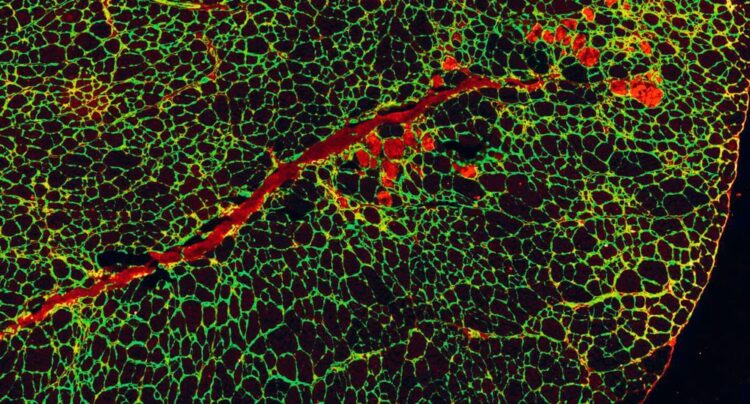Urolithin A shows effective against muscular dystrophy

Regenerating muscle cells thanks to Urolithin A
Credit: © Amazentis / EPFL Auwerx Lab
Progression of Duchenne Muscle Dystrophy (DMD) can be delayed in mice by supplementing their diets with Urolithin A, according to new results reported today. The findings, published in Science Translational Medicine, raise hopes that new treatment options could one-day be developed for DMD, an uncurable genetic condition characterized by progressive muscle degeneration. About 1 in 3,500 boys are born with DMD, which usually develops in childhood and significantly reduces life expectancy.
The new research carried out at the laboratory of Professor Johan Auwerx, MD, PhD at the Swiss Federal Institute of Technology EPFL and the University of Lausanne in collaboration with scientists at the Swiss life science company Amazentis, highlights the important role that defective mitochondria can play in DMD. The powerhouses of cells, mitochondria produce the energy necessary for normal muscle function. But muscle cells taken from both human DMD patients and from mice bred to mimic the condition show significant defects in mitochondrial activity, the study finds. Specifically, patterns of gene expression show the development of DMD is associated with a marked decrease in mitophagy – the process cells rely on to remove and recycle defective mitochondria and maintain energy levels high.
“Duchenne Muscle Dystrophy is the most common fatal genetic disease diagnosed in childhood with still no cure available,” says Johan Auwerx, MD, PhD, lead-author and Professor at the EPFL. “Our work represents a significant breakthrough in the search for new therapeutic approaches for muscular dystrophies.”
The natural compound Urolithin A is known to activate mitophagy and improve mitochondrial health in both mice and humans. When the study scientists and lead authors, Peiling Luan and Davide D’Amico, fed the compound to DMD mice for just ten weeks, they saw mitophagy levels rise effectively restoring them to normal. This led to a significant reduction of muscle damage and improvement in muscle health and performance. The DMD mice administered Urolithin A saw grip strength increase by 31% and running performance increase by 45% compared with control untreated animals. And they lived longer – survival increased by 40%.
Importantly for the human disease, Urolithin A reduced a damaging condition called fibrosis in muscles of the DMD mouse heart and diaphragm by 36% and 39%, respectively. Similar damage seen in DMD patients typically leads to fatal cardiac or respiratory failure. Urolithin A was also able to enhance the regeneration of mouse muscle stem cells. This is particularly relevant to the disease in humans as the onset of DMD is linked with the exhaustion of functional stem cells.
Davide D’Amico, PhD, Project Leader at Amazentis and a first author of the paper, said: “Prior to this study, it was understood that the dramatic loss of muscle function in DMD patients was associated with mitochondrial dysfunctions. Here we discovered that defective mitophagy, the removal and recycling of dysfunctional mitochondria, plays a key role in the progression of DMD.”
Chris Rinsch, PhD, Co-founder and CEO of Amazentis, said, “The rigorous science being published in Science Translational Medicine strengthens the scientific evidence of Urolithin A as a potent enhancer of muscle function. It’s exciting to see this natural metabolite can support not only healthy muscle, but also shows promise for progressive muscle diseases in pre-clinical research.”
###
The results are reported in the current issue of Science Translational Medicine in the article: “Urolithin A improves muscle function by rescuing mitophagy in muscular dystrophy”.
Background on Urolithin A
Amazentis’ proprietary lead product is an oral formulation of Urolithin A. Urolithin A is a microflora-derived metabolite of ellagitannins, a class of compounds found in the pomegranate and other fruits and nuts. Administration of Urolithin A leads to improved mitochondrial function by stimulating mitophagy, a process by which aging and damaged mitochondria are cleared from the cell, stimulating growth of healthy mitochondria. Mitophagy declines in cells as we age, and the reduction in mitochondrial function in the muscles is thought to be one of the main causes of age-related muscle decline. Previously, Amazentis and the EPFL reported preclinical results in Nature Medicine in an article titled, “Urolithin A induces mitophagy and prolongs lifespan in C. elegans and increases muscle function in rodents” (doi:10.1038/nm.4132) and clinical results showing Urolithin A’s safety, bioavailability and its impact on biomarkers of mitochondrial health in Nature Metabolism in an article entitled “The mitophagy activator urolithin A is safe and induces a molecular signature of improved mitochondrial and cellular health in humans (doi: 10.1038/s42255-019-0073-4). For more information, please visit http://www.
About Amazentis
Amazentis is an innovative life science company that employs today’s leading research and clinical science to develop the next generation of products targeting mitochondrial health for advanced nutrition. The company has recently concluded two clinical trials evaluating the benefits of Urolithin A on skeletal muscle in healthy adults. For more information on Amazentis, please visit http://www.
All latest news from the category: Health and Medicine
This subject area encompasses research and studies in the field of human medicine.
Among the wide-ranging list of topics covered here are anesthesiology, anatomy, surgery, human genetics, hygiene and environmental medicine, internal medicine, neurology, pharmacology, physiology, urology and dental medicine.
Newest articles

Parallel Paths: Understanding Malaria Resistance in Chimpanzees and Humans
The closest relatives of humans adapt genetically to habitats and infections Survival of the Fittest: Genetic Adaptations Uncovered in Chimpanzees Görlitz, 10.01.2025. Chimpanzees have genetic adaptations that help them survive…

You are What You Eat—Stanford Study Links Fiber to Anti-Cancer Gene Modulation
The Fiber Gap: A Growing Concern in American Diets Fiber is well known to be an important part of a healthy diet, yet less than 10% of Americans eat the minimum recommended…

Trust Your Gut—RNA-Protein Discovery for Better Immunity
HIRI researchers uncover control mechanisms of polysaccharide utilization in Bacteroides thetaiotaomicron. Researchers at the Helmholtz Institute for RNA-based Infection Research (HIRI) and the Julius-Maximilians-Universität (JMU) in Würzburg have identified a…



